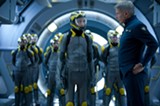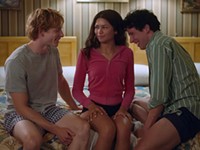[
{
"name": "500x250 Ad",
"insertPoint": "5",
"component": "15667920",
"parentWrapperClass": "",
"requiredCountToDisplay": "1"
}
]
The ambiguity of its title reflects some of the same quality in the content of "Ender's Game." Ender Wiggin, the protagonist and intermittent narrator, plays numerous advanced versions of video games throughout the movie, some of them forming an integral part of the action; at the same time, as the script puns on his name, he accomplishes a sort of end game that creates the climax and even promises a sequel.
Based on a novel by Orson Scott Card, the film posits a future in which 50 years before, a horde of extraterrestrial aliens attacked Earth, killing millions of people, only to be defeated in a great air battle by a legendary commander named Mazer Rackham (Ben Kingsley). Since then the world government has recruited specially gifted children to defend against any future attack, on the grounds that only young people can absorb all the complex information and skills to command the technology of maneuvering spacecraft against an alien force.
The most brilliant and talented of those children, Ender (Asa Butterfield) also suffers a number of internal conflicts connected to his equally gifted siblings. His brother Peter (Jimmy Pinchak) and his sister Valentine (Abigail Breslin) both washed out of the space program, Peter for his psychotic tendency to violence, Valentine for her soft-heartedness. Ender combines both qualities, which wage a kind of war against each other in his psyche and often break out in moments of crisis.
Despite its action in the future, its location in various space stations, and its concentration on the most advanced technology imaginable, most of the movie resembles one of those basic-training flicks familiar to any fan of the war film, a futuristic version of "The Sands of Iwo Jima," "Battle Cry," "Full Metal Jacket" "Heartbreak Ridge," or a score of others. It comes complete with a large, loud sergeant (Nonso Azonie), a relentlessly demanding commanding officer, Colonel Graff (Harrison Ford), and a platoon of obnoxious recruits.
Colonel Graff believes intensely in a kind of Darwinian selection, so he encourages all the trainees — called launchies — at the space stations to compete vigorously against each other in every area, from classroom performance to hand-to-hand combat. Since he is the best and the brightest, most of his peers hate Ender, which pleases the colonel mightily, because it will temper and harden the weapon that his favorite recruit will become. Ender's worst battle pits him against one of the most obnoxious little punks in cinema, a rival named, of all things, Bonzo (Moises Arias).
Despite his gifts and accomplishments, throughout that hardening process Ender suffers a good deal of self-doubt and both emotional and physical pain. His fellow students ostracize, insult, and abuse him — the picture positively overflows with bullies of all kinds — which leads him to some violent retaliation that he later regrets, but which the colonel finds most gratifying. Ender must overcome a host of problems to become commander and eventually admiral of the space fleet, pretty good, if a touch incredible, for a wispy little kid of 14.
Poor Asa Butterfield must carry most of the picture on his narrow shoulders, a heavy task for a short, skinny, rather unimpressive young boy, whose constant frown and occasional teariness grow just a bit tiresome. In a disappointing comedown from his terrific performance in "42," Harrison Ford mostly sticks to one gruff note as Colonel Graff; his second in command, played by Viola Davis, offers something of a sympathetic foil to the recalcitrant, permanently angry colonel.
The picture itself follows a most predictable trajectory of action, but employs its visual effects brilliantly. Although unlike "Gravity," filmed in the traditional two-dimensions, "Ender's Game" displays a remarkable array of special effects, particularly in its many sequences of weightless travel and mock combat. The actors float and soar in a kind of lyrical space ballet, free of all limits, free of the normal constrictions of physics, in a really quite beautiful series of images.
Although the concept of a futuristic war against aliens from another planet directed and fought by a bunch of pubescent kids hardly seems likely, we should recall the ages of those thousands of soldiers and sailors lost in two world wars, Korea, Vietnam, and the Middle East. Wars are fought by children.
Speaking of...
-

The realistic grief of ‘Cherry’
Apr 2, 2021 -
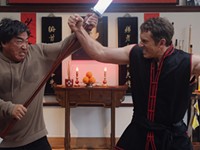
Anomaly film festival review: 'The Paper Tigers'
Nov 13, 2020 -
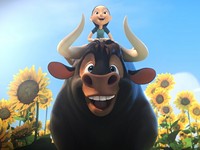
Film review: 'Ferdinand'
Dec 18, 2017 - More »
Latest in Movie Reviews
More by George Grella
-

Film Review: "Cake"
Jan 26, 2015 -
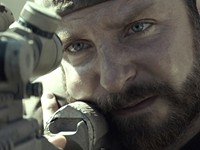
Film Review: "American Sniper"
Jan 19, 2015 -

Film Review: "Inherent Vice"
Jan 12, 2015 - More »
